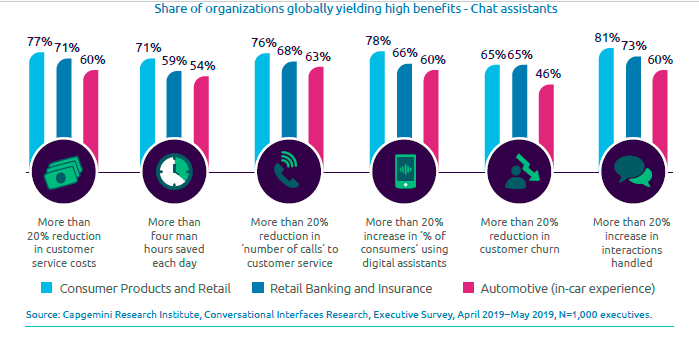Some consumers prefer chatbots to real sellers, but despite impressive pilot projects they are yet to meet the demand for widespread use - is it worth the investment then?
They don’t always have to be from China: Bots like janitor Horst from Telekom are welcome and already established in Germany, too. More and more consumers even prefer chatbots to a human consultant and salesperson, according to a report by our Capgemini Research Institute. It all depends on the situation: Consumers often search for new products and services or questions about the purchase on the couch in the evening, after business hours. Although companies and consumers alike are convinced of the advantages, the actual use of the product seems to lag behind the enthusiasm and demand. Less than half of the top 100 players in the automotive, consumer goods and retail sectors, as well as banks and insurance companies, use chats.
Return on Investment (ROI) of chatbots exceeds expectations
Our research found that more than three-quarters of the organizations surveyed (76%) had gained measurable benefits from chat assistants. In addition, as many as 58% said that the benefits exceeded their expectations. Our focus here was on the automotive, retail, banking and insurance sectors - the details are shown here in the overview:

The benefits of chatbots covers all operational improvements in customer experience and we look at them in two dimensions: As the figure above shows, many organizations - across different sectors - gained significant benefits by reducing service costs and customer churn. For example, both voice and chat solutions have enabled many organizations to reduce customer service costs by more than 20 percent.
Customer loyalty: Consumers know what they want but further product growth is needed
Consumers are gradually feeling more comfortable in dialogue with conversation assistants. At the same time, they are also developing clear expectations of when they want to talk to a bot and when a real person should take over. Used correctly, chat assistants have considerable potential to change the customer experience as we know it.
However, our research shows that many organizations' approaches have not yet matured, lacking both customer focus and organizational skills when it comes to the use in practice. As a result, they lack the ability to build deeper, more valuable relationships with their customers. Organizations must understand the evolving dynamics of where and when a consumer would appreciate human-machine communication. Based on this knowledge it is possible to generate the ideal human/bot combination. Organizations should develop their consumer/brand relationship through conversational assistants in the key areas of transparency and value. In other words: consumers, including German consumers, are happy to share their personal information if they receive something in return - provided, of course, that their data is protected and the organization communicates transparently on how it is used.
Guaranteed privacy is not an obstacle
Another increasingly important factor is understanding the role of ethics in the success of a conversational interface. Given the high-profile incidents we have witnessed with self-learning chatbots that have adopted prejudice, organizations must ensure that they build on the right ethical foundations from the beginning. My impression is that we are at the start of the conversational interface revolution. It is important to remember that this revolution is not just about the use of a new medium. It is about how customer orientation is the key to a superior experience, over and over and again.